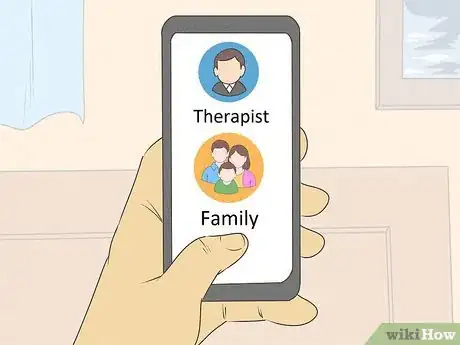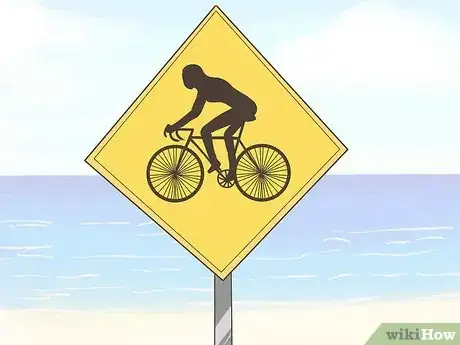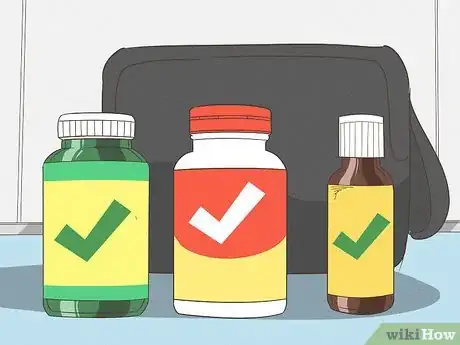This article was co-authored by Natalia S. David, PsyD. Dr. David is an Assistant Professor in Psychology at the University of Texas Southwestern Medical Center and a Psychiatry Consultant at Clements University Hospital and at Zale Lipshy University Hospital. She is a member of the Board of Behavioral Sleep Medicine, the Academy for Integrative Pain Management, and the American Psychological Association’s Division of Health Psychology. In 2017, she received the Baylor Scott & White Research Institute’s Podium Presentation Award and scholarship. She received her PsyD from Alliant International University in 2017 with an emphasis in Health Psychology.
There are 11 references cited in this article, which can be found at the bottom of the page.
This article has been viewed 13,973 times.
Vacation for those with depression can be far different than for those who don’t have it. While it can be a time of enjoyment and relaxation, it can also become stressful and overwhelming. The key is to plan ahead for what to expect and do what you can to take as much pressure off of yourself as possible. This is achievable when you select the right vacation, do what you can to avoid stress, and are realistic with your expectations.
Steps
Selecting the Right Vacation
-
1Choose a vacation that matches your personality. Placing pressure on yourself to go on a vacation you think you’re “supposed” to go on will only add to the depression you’re feeling. Instead, select a destination that will allow you to get what you want out of the vacation. Going somewhere you can’t fully enjoy or a place that makes you feel inadequate will only make your depression worse.
- For instance, if lying around doing nothing on a beach will make you feel even more tired and down, avoid doing so. If you think it is just what you need, however, go ahead and book this type of vacation. If adrenaline rushes are your thing, consider going hiking or to an amusement park, then choose something that will make you feel alive. Tailoring your vacation to match your personality and mood allows you to fully enjoy it and get what you need.[1]
- You may not always have control over the events or destination of your vacation, such as if you are traveling with family. If this is the case, make sure you carve out some time for yourself, and talk to whoever is in charge of planning to see if you you can schedule something you really enjoy.
- For instance, if your family is going on a beach vacation but that's not something you enjoy, you might say, "Hey Dad, I just saw that the hotel offers snorkeling lessons. Can I sign up?" Or, "Mom, there's an amusement park 20 minutes from the hotel. Do you think you and I could go one day of our vacation?"
-
2Select a destination that will have a small impact on your routine. Those with depression have to be very careful when selecting where to go and for how long. Disrupting your life and routine dramatically may be too much for you, which can result in you feeling worse. Instead, choose a place that allows you to maintain yourself, but also create the vacation you desire.
- Choosing a place with a different time zone may be too much for your body to handle. Jet lag can cause you to feel even more run down, which can defeat the purpose of your vacation. Instead, go somewhere that allows you to do what you need to feel good.
- Additionally, going somewhere that is completely out of your comfort zone may be too overwhelming. For instance, if you live in the country and are used to quiet, going to a big city that is fast-paced and extremely populated may be too much for you to handle.[2]
- If you can't avoid traveling to a different time zone, take steps to help you adjust and recalibrate your sleep cycle. You can try taking melatonin 30 minutes before you want to sleep, or take a bath using lavender oil, which can make you feel sleepy and relaxed. Try to get some sun during the day, as this can help reset your sleep/wake cycle.[3]
Advertisement -
3Stay in contact with your support team. If you rely on others to help you during your struggles, you’ll need to have access to them whenever you need their support. This means you’ll have to plan your destination accordingly. Choose a location in which you can get in touch with your friends, family, and doctor whenever you need them the most.
- For example, avoid choosing a place that has a drastically different time zone, or one in which they’ll be asleep when you’re awake. If you can’t get in touch with them, you may feel isolated and alone, which will only make you feel worse.
- Ask your therapist if they are willing to do a phone or video session while you are gone.
- You’ll need to have access to strong phone signals and the wifi if this is how you will contact your support team. Choosing a remote destination in the middle of nowhere may not be the best choice.[4] Call ahead to the hotel where you will be staying and make sure they have internet accessibility and ask about the strength of their mobile phone signals.
-
4Decide whether you need reinforcements. In addition to staying in touch with your therapist and support team at home, it may be wise to bring a loved one along for the trip. Invite those who bring you peace of mind, help you relax or make you laugh.
- While it may seem like a depressed person needs to have a companion on vacation, many find that solitude helps them feel better. So, it's up to you whether you bring someone along or merely keep in touch with your support group back home.[5]
- You know yourself better than anyone. Will it help to have your best bud dragging you out of bed each morning with excitement? Or would you rather plan your day as you please on a solo trip?
Taking Care Not to Create More Stress
-
1Ask for help from the professionals. Planning a vacation is often stressful. With so many important details to take into consideration, you can feel completely overwhelmed trying to take care of them all. Instead of wearing yourself out, allow a professional to do the job for you. Hire a travel agent to take care of everything for you, and you’ll prevent being completely stressed out before you hit the road. [6]
- For example, selecting a destination that is all-inclusive can be one way to use the help of professionals to your advantage. These locales generally include food, attractions, and lodging for one price, which means you won't have the added stress of arranging and paying for them separately. You can pretty much pack your bag and show up to enjoy the benefits.
-
2Choose your travel companions wisely. Since you are going on vacation, avoid asking any friends or family who add stress to your life. If you decide to invite someone such as a family member, friend, or partner make sure they are considerate of your need to spend some time alone and get plenty of rest. Avoid hanging with people who are heavy drinkers or late-night party-goers — these habits can worsen your mood.
- Minimize added stress by making sure you have the same expectations for the trip. It can lead to tension if one person was planning to laze away the days while the other had a jam-packed itinerary of tours and attractions planned. Be on the same page with any travel companions to ensure that you enjoy your trip.[7]
-
3Work on coping strategies with your therapist before you leave. Bringing a “toolkit” of positive, effective coping strategies will help you tackle vacation stress when it does arise. In the weeks before your vacation, work with your therapist on strategies to reduce stress or deal with symptoms of depression that may flare up on your trip.
- You and your therapist might go over stress coping skills like deep breathing, meditation, or positive visualization.
- Strategies to deal with depressive symptoms might include scheduling daily exercise on your vacation, ensuring you get sunlight every day, choosing healthy foods (like those containing omega-3's), and how to challenge negative thinking.[8]
- Bring a journal with you and write in it daily, even for just a few minutes. Allow yourself to be totally honest and write anything you feel. Expressing yourself in this way can help manage depression.[9]
-
4Take your finances into consideration. Vacations usually aren’t cheap, which is stressful in itself. To avoid bringing this black cloud of debt with you, get realistic about how much you can actually afford. If you can’t afford much, look into activities that are free or cost-effective.
- For example, explore the sharing economy to find affordable places to stay and transportation. Additionally, select activities that are free, such as bike riding, hiking, or exploring a beach. You’ll find that you can still have a great time, without adding the stress of spending too much money.
-
5Bring an adequate amount of medication with you. If you take medication to manage your depression, vacation is the time you may need it the most. Ensure you bring the amount you need, and a few extra just in case. Don’t assume that you will only need what you typically take, as the change in your surroundings may require more.
- Get your refills before you hit the road. A pharmacy in a different area may not have the medication you need or your doctor may not be able to prescribe the medication in a different state. Taking care of everything before you go on vacation may prevent any additional stress.
-
6Plan ahead for problems. Lost luggage, bad weather, and/or car trouble are known to derail the most-anticipated vacations. Be sure to schedule in extra days for delayed travel due to transportation issues or nasty weather. Furthermore, pack one or two outfits plus your personal essentials in a carry-on bag so that you have the basics in case your luggage is lost.[10]
- Talk to a travel agent or airline representative about other ways you can protect your vacation against any surprise incidents. It may even be wise to purchase travel insurance in the event you are forced to cancel at the last minute due to depression.
Being Realistic With Yourself
-
1Avoid comparing yourself to others. Many people with depression fall into the trap of comparing others’ vacations to theirs. You may look at the vacationers around you and wonder why you’re not enjoying yourself as much as they are. Placing pressure on yourself to enjoy what you think you should can make you feel worse. Instead, realize you probably aren’t seeing the bigger picture.
- Vacations aren’t great for everyone all of the time. The family you see enjoying themselves on the beach may have just come back from having a huge fight. Or perhaps the kids just had a major meltdown that was extremely stressful. You’re likely having just as good of a time as they are, you just happen to see them during a good time.[11]
-
2Realize a vacation won’t “fix” you. Unfortunately, depression doesn’t magically disappear when you go on vacation. In fact, sometimes it may make its presence known even more during this time. Letting go of that expectation and facing reality may make your vacation that much more enjoyable.
-
3Expect “bad” days. Not every vacation day will be filled with feelings of happiness. You may have some days when the depression takes over, no matter how gorgeous the scenery is. Be gentle on yourself and realize that these moments are just a part of your life, and you will get through it.
- One way to make the bad days a little better is to be open with those around you. Tell them, “I’m not feeling very well today, so I need a little space,” or whatever it is you require. Being honest with what is going on instead of trying to hide how you really feel will make it easier on yourself, and those around you.[12]
References
- ↑ http://susannoonanmd.com/summer-vacation-and-depression/
- ↑ http://natashatracy.com/bipolar-blog/vacations-bipolar-depression-worse/
- ↑ http://www.health.com/health/gallery/0,,20322187,00.html
- ↑ http://www.webmd.com/depression/features/vacation-depression#1
- ↑ http://www.huffingtonpost.com/2013/04/17/traveling-alone-5-stress-relieving-benefits_n_3094527.html
- ↑ http://www.webmd.com/depression/features/vacation-depression#4
- ↑ https://www.themuse.com/advice/3-tips-for-picking-your-perfect-travel-partner
- ↑ https://www.helpguide.org/articles/depression/dealing-with-depression.htm
- ↑ http://www.everydayhealth.com/depression-photos/ways-to-cope-with-depression.aspx#03








































































